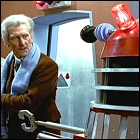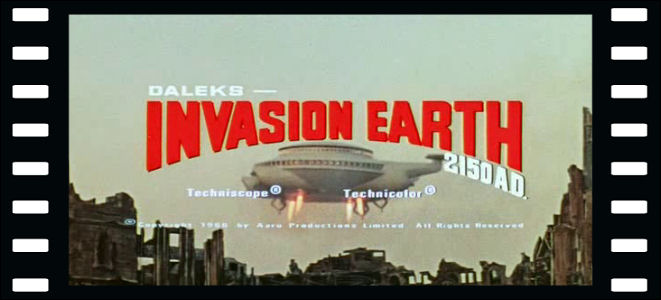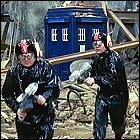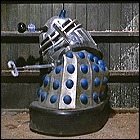 The feature film Daleks: Invasion Earth 2150 A.D., a big-screen adaptation of the Doctor Who television story The Dalek Invasion Of Earth, premieres in British theaters, starring Peter Cushing, Bernard Cribbins, Jill Curzon, and Roberta Tovey. Like its predecessor the year before, this movie sits comfortably outside the rest of Doctor Who lore.
The feature film Daleks: Invasion Earth 2150 A.D., a big-screen adaptation of the Doctor Who television story The Dalek Invasion Of Earth, premieres in British theaters, starring Peter Cushing, Bernard Cribbins, Jill Curzon, and Roberta Tovey. Like its predecessor the year before, this movie sits comfortably outside the rest of Doctor Who lore. ![]()
 London beat cop Tom Campbell fails to stop a smash-and-grab robbery, knocked out by the burglars before there’s even an alarm to respond to. He comes to and opens the door of the nearest police box, finding not police equipment but a vast, laboratory-like space before he loses consciousness again. When he awakens, an old man introduces himself as time traveler Doctor Who and informs Tom that the police box he stumbled into was a time machine that has now traveled to London in the year 2150. London is in ruins, with little human activity – and the time travelers soon find that the entire world has been overrun by Daleks. Susan and the Doctor’s niece, Louise, are sheltered by desperate human resistance fighters, while Doctor Who and Tom are captured by the Daleks and taken aboard one of their spaceships. An escape attempt that seems a little too easy turns out to be a trap: the Doctor and Tom are selected to be turned into Dalek-controlled Robomen due to their intelligence. The conversion process is thwarted by the resistance cell, but Louise is knocked out while hiding on the ship; Tom stays on board, disguised as a Roboman, to protect her. Susan and Doctor Who separately make their way to an enormous mine at Bedfordshire, where the Daleks are using human slave labor to dig a shaft to the Earth’s magnetic core – a task that they can’t undertake themselves due to the magnetic forces. They plan to destroy that core and replace it with a means of controlling the Earth like a gigantic spaceship, enabling them to take the planet back to Dalek territory to be strip-mined, and any human survivors enslaved. The Doctor realizes what must be done to stop the Dalek plan, but it falls to Tom, the least experienced of the time travelers, to single-handedly rid the world of Dalek domination.
London beat cop Tom Campbell fails to stop a smash-and-grab robbery, knocked out by the burglars before there’s even an alarm to respond to. He comes to and opens the door of the nearest police box, finding not police equipment but a vast, laboratory-like space before he loses consciousness again. When he awakens, an old man introduces himself as time traveler Doctor Who and informs Tom that the police box he stumbled into was a time machine that has now traveled to London in the year 2150. London is in ruins, with little human activity – and the time travelers soon find that the entire world has been overrun by Daleks. Susan and the Doctor’s niece, Louise, are sheltered by desperate human resistance fighters, while Doctor Who and Tom are captured by the Daleks and taken aboard one of their spaceships. An escape attempt that seems a little too easy turns out to be a trap: the Doctor and Tom are selected to be turned into Dalek-controlled Robomen due to their intelligence. The conversion process is thwarted by the resistance cell, but Louise is knocked out while hiding on the ship; Tom stays on board, disguised as a Roboman, to protect her. Susan and Doctor Who separately make their way to an enormous mine at Bedfordshire, where the Daleks are using human slave labor to dig a shaft to the Earth’s magnetic core – a task that they can’t undertake themselves due to the magnetic forces. They plan to destroy that core and replace it with a means of controlling the Earth like a gigantic spaceship, enabling them to take the planet back to Dalek territory to be strip-mined, and any human survivors enslaved. The Doctor realizes what must be done to stop the Dalek plan, but it falls to Tom, the least experienced of the time travelers, to single-handedly rid the world of Dalek domination.
written by Milton Subotsky
additional material by David Whitaker
based on the television serial by Terry Nation
directed by Gordon Flemyng
music by Bill McGuffie / electronic music by Barry GrayCast: Peter Cushing (Doctor Who), Bernard Cribbins (Tom Campbell), Ray Brooks (David), Andrew Keir (Wyler), Roberta Tovey (Susan), Jill Curzon (Louise), Roger Avon (Wells), Geoffrey Cheshire (Roboman), Robert Jewell (Leader Dalek Operator), Keith Marsh (Conway), Philip Madoc (Brockley), Steve Peters (Leader Roboman), Eddie Powell (Thompson), Godfrey Quigley (Dortmun), Peter Reynolds (Man on Bicycle), Bernard Spear (Man with Carrier Bag), Sheila Steafel (Young Woman), Eileen Way (Old Woman), Kenneth Watson (Craddock), John Wreford (Robber)
Notes: Several actors in this film have also appeared in the television series (in very different roles, naturally): Eileen Way appeared in An Unearthly Child (1963), while the late Philip Madoc made multiple appearances (The Krotons, The War Games, The Brain Of Morbius, The Power Of Kroll and even the Big Finish audio plays Master and Return Of The Krotons). Geoffrey Cheshire appeared in The Time Meddler (1965) and The Daleks’ Masterplan (1965-66), while Kenneth Watson guest starred in The Wheel In Space (1968). Roger Avon also appeared in The Daleks’ Masterplan and The Crusade (1965). The only Dalek operator credited, Robert Jewell, could also be found inside Dalek casings from their very first TV appearance through their final cameo appearance in the show’s black-and-white years (The War Games, 1969).
Doctor Who says that his time-and-space machine, Tardis, can take its occupants to “any time, on any planet, in any universe,” a line of dialogue inadvertently leaving the door open – if any writers are bold enough to step through it – to actually connect the two Cushing films to the TV series by way of the old “parallel universe” standby. In the event that should happen, Tom Campbell should probably steer clear of Donna’s grandfather, Wilfred Mott, since both TARDIS travelers were played by the late comedian Bernard Cribbins. The Dalek units of time measurement, rels, have been mentioned in many a Dalek episode since the seriesÊ revival, but the first use of rels was in this movie.
 Review: With the lessons of Dr. Who And The Daleks learned, Daleks: Invasion Earth 2150 A.D. is a vast improvement. The Daleks sound and act more like the Daleks viewers were familiar with from TV, and they actually appear more formidable in many scenes here by the simple virtue that a movie budget could afford to make more Dalek casings than the BBC ever could. The Daleks here appear in swarms, making for a fairly intimidating sight in some scenes, and their livery is a bit less ridiculously colorful; most of the Dalek patrols bear the silver-and-blue colors of their television counterparts (as revealed by behind-the-scenes photos; naturally this color scheme couldn’t really be seen in black & white). The quotient of action and violence is upped considerably, and the gritty deserted-future-London setting is a bit easier to swallow than the more fantastic environs of the first movie.
Review: With the lessons of Dr. Who And The Daleks learned, Daleks: Invasion Earth 2150 A.D. is a vast improvement. The Daleks sound and act more like the Daleks viewers were familiar with from TV, and they actually appear more formidable in many scenes here by the simple virtue that a movie budget could afford to make more Dalek casings than the BBC ever could. The Daleks here appear in swarms, making for a fairly intimidating sight in some scenes, and their livery is a bit less ridiculously colorful; most of the Dalek patrols bear the silver-and-blue colors of their television counterparts (as revealed by behind-the-scenes photos; naturally this color scheme couldn’t really be seen in black & white). The quotient of action and violence is upped considerably, and the gritty deserted-future-London setting is a bit easier to swallow than the more fantastic environs of the first movie.
Sadly, for every element that this movie gets right, it also gets another thing wrong. The patent leather Roboman suits don’t do anyone any favors, and the helmets and their faceplates are even worse, embarrassingly misaligned in many (if not most) scenes. It would perhaps be even sillier if every Roboman suit was obviously tailored to the wearer, but somewhere there must be some middle ground between bespoke tailoring and crumpled-and-dumpy. There’s a scene of wordless, purely physical comedy, beautifully played by Bernard Cribbins, where the ill-fitting outfits are just a little bit distracting.
 And then there’s the far-too-quick resolution of the story: in a control room fitted with wheel valves, toggle switches and a radio-studio-style condenser microphone (why would Daleks have any of these things installed on their own ship, especially when they’re so badly suited to Dalek appendages?), Doctor Who grabs the microphone and places a non-countermandable order for all Robomen to turn on their Dalek masters, creating a diversion. As unstoppable and all-conquering as the Daleks have been shown to be in the rest of the film, this is simply silly. To be sure, it’s a plot point copied from the original TV version of the same story (see page 31), but the big honking radio microphone makes it inadvertently funny. Also unintentionally hilarious is the death of some of the Daleks as they’re drawn to their doom by the magnetic forces beneath Earth’s crust. There are impressive Dalek exits (the Dalek that’s crushed by an unseen force) and chuckle-inducing ones (the ones that power-dive the mineshaft, breaking off every possible appendage en route).
And then there’s the far-too-quick resolution of the story: in a control room fitted with wheel valves, toggle switches and a radio-studio-style condenser microphone (why would Daleks have any of these things installed on their own ship, especially when they’re so badly suited to Dalek appendages?), Doctor Who grabs the microphone and places a non-countermandable order for all Robomen to turn on their Dalek masters, creating a diversion. As unstoppable and all-conquering as the Daleks have been shown to be in the rest of the film, this is simply silly. To be sure, it’s a plot point copied from the original TV version of the same story (see page 31), but the big honking radio microphone makes it inadvertently funny. Also unintentionally hilarious is the death of some of the Daleks as they’re drawn to their doom by the magnetic forces beneath Earth’s crust. There are impressive Dalek exits (the Dalek that’s crushed by an unseen force) and chuckle-inducing ones (the ones that power-dive the mineshaft, breaking off every possible appendage en route).
At only 80 minutes, though, it’s possible that Daleks: Invasion Earth 2150 A.D. does the audience a favor by dispensing with some of the padding present in the six 25-minute episodes of The Dalek Invasion Of Earth. And it’s also possible that the second and final Cushing movie served another useful purpose: premiering in the precise center of the “off-season” between the third and fourth seasons of the TV series, this movie debuted almost exactly three months before the television Doctor’s first regeneration. Peter Cushing’s portrayal of – admittedly – another time traveler known as Doctor Who may have helped to seed the idea that the TARDIS could be piloted by someone other than William Hartnell. It was an idea that audiences would have to get their heads around just a few months after the premiere of this film.
LogBook entry & review by Earl Green
